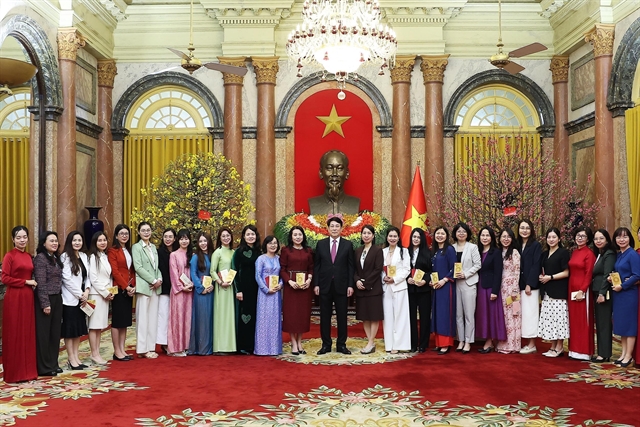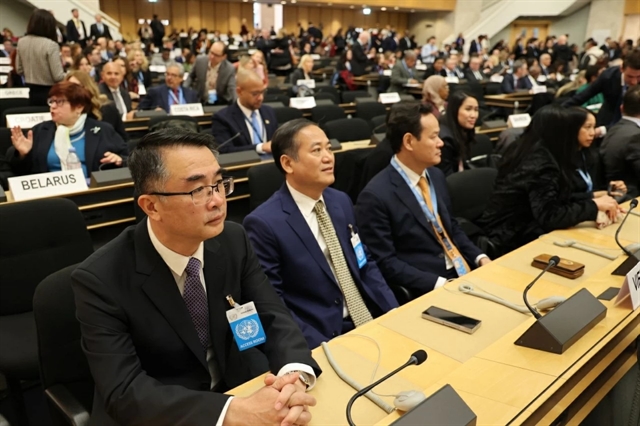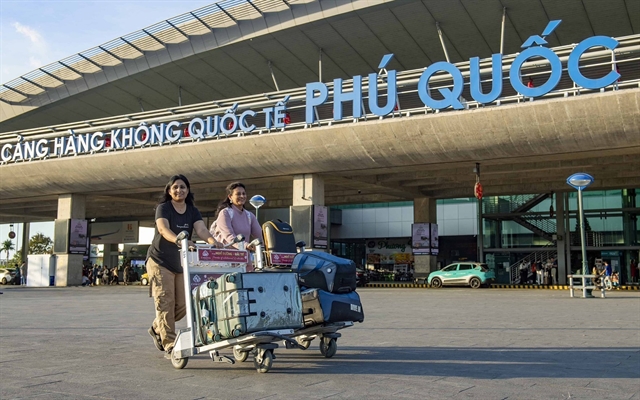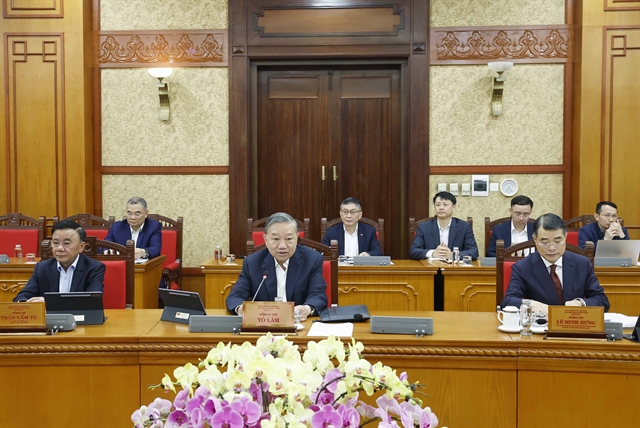 Society
Society
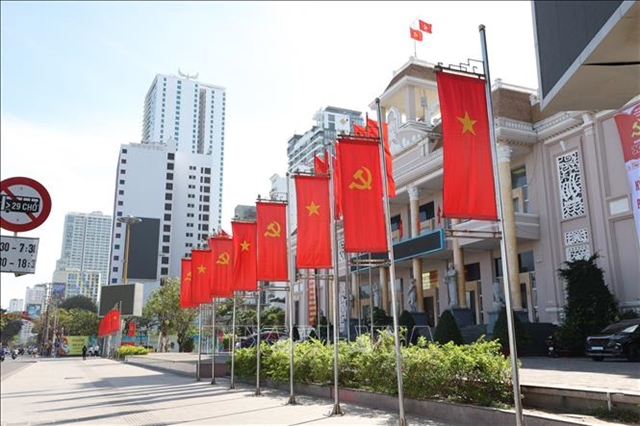
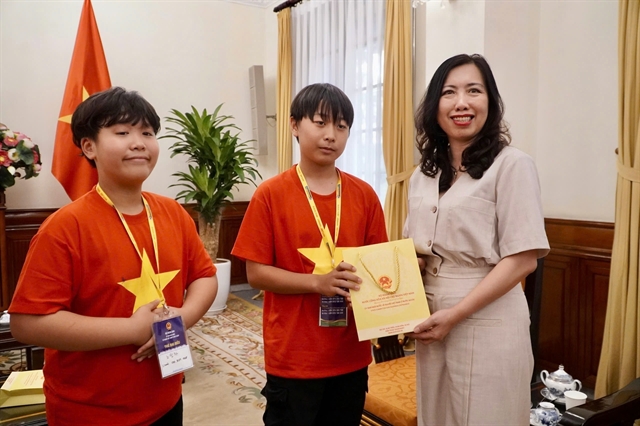 |
| Deputy Minister of Foreign Affairs Lê Thị Thu Hằng presents gifts to overseas Vietnamese children from the Republic of Korea. VNA/VNS Photo |
The Central Committee for Overseas Vietnamese (CCOV), now the State Committee for Overseas Vietnamese (SCOV) under the Ministry of Foreign Affairs, has made significant achievements since its establishment 65 years ago (1959–2024).
Deputy Minister of Foreign Affairs Lê Thị Thu Hằng, chairperson of the SCOV, spoke with the Vietnam News Agency about the achievements of the work concerning the Vietnamese diaspora and the plans to mobilise their resources more effectively to contribute to their homeland's development.
Could you tell us about the reforms that the SCOV has undertaken over the past 65 years to fulfil its advisory role for the Party and the State and to implement policies related to overseas Vietnamese?
The work concerning overseas Vietnamese has always been significant in terms of the policies and directives of the Communist Party and the State of Việt Nam. From its establishment as the CCOV in 1959 to the present day, the SCOV, has undergone reforms to meet the increasing demands for supporting, assisting and harnessing the resources of the Vietnamese diasporic community.
The Prime Minister on November 23, 1959 signed a decree to establish the CCOV, marking a milestone in the nation's efforts to support the overseas Vietnamese community. It was the first specialised government agency established to mobilise, support and protect the rights of Vietnamese people living abroad.
After the country’s reunification in 1975 and in the face of significant challenges, the committee underwent structural changes, transforming from an inter-agency council into a specialised body with specific responsibilities. Amid the growing diversity in the Vietnamese diasporic community, in terms of composition and political views, the committee persistently implemented policies to unite and protect them.
In 1995, the committee was officially placed under the Ministry of Foreign Affairs, affirming the strategic importance of the Vietnamese diaspora affairs within the diplomatic sector. During this period, efforts focused on connecting the Vietnamese diasporic community to the nation through initiatives such as facilitating visits, investments and contributions to national socio-economic development.
The Politburo in March 2004 issued a resolution, asserting that "Overseas Vietnamese are an inseparable part and a vital resource of the Vietnamese nation", and serving as a guiding principle for all activities across the political system, including the committee's efforts.
In recent years, it has restructured towards greater efficiency while ensuring the effective implementation of its expanded responsibilities, which range from policy advisory roles to protecting the rights of the Vietnamese diasporic community and connecting them with their homeland. This streamlining has not only improved operational efficiency but also met the demands for modernisation and international integration.
Recognising that people are the core factor in the success of its work, the committee has prioritised training and fostering its staff to build a team that is not only professionally competent and policy-savvy but also empathetic to the sentiments and aspirations of overseas Vietnamese, thereby strengthening trust and connection between them and their homeland.
Looking back on the 65-year journey, the committee's growth is tied to the expanding strength of the Vietnamese diasporic community. This stands as a testament to the unceasing efforts to innovate its organisation and activities to fulfil its advisory role for the Party and State, while effectively implementing policies concerning the Vietnamese diaspora, contributing to national unity and the country's development.
What are the notable achievements in the work concerning overseas Vietnamese?
The work concerning overseas Vietnamese has over the past 65 years made multiple achievements, significantly contributing to national unity and leveraging the collective strength of the entire people in the nation-building and development process.
First, the committee has advised the Politburo on issuing strategic directives, most notably Resolution 36, Directive 45, and Conclusion 12, reaffirming the consistent policy of considering the Vietnamese diaspora as an inseparable part and a vital resource of the Vietnamese nation. These documents reflect the Party and State's deep care and responsibility towards the Vietnamese diasporic community, addressing their legitimate aspirations, encouraging their efforts to excel and mobilising their potential, patriotism and contributions to the homeland.
Based on these guidelines, the committee has led and coordinated with relevant agencies to propose new policies and amend existing regulations to defend the practical and effective rights of the Vietnamese diasporic community.
Vietnamese legal frameworks on nationality, entry, exit and residence visas, along with revisions to laws such as the Investment Law, the Land Law and the Housing Law, have become more accommodating, enabling the Vietnamese diaspora to enjoy rights and obligations similar to those of citizens within the country, encouraging their investments and businesses in Việt Nam.
Furthermore, efforts to strengthen national unity have seen groundbreaking progress. Through activities organised by the committee (which have become hallmark events like the Homeland Spring Programme, visits to Trường Sa islands and Hùng Kings Commemoration) and the Party and State's policies on national unity, greater trust and enthusiasm have been fostered, reinforcing the connection between the overseas community and the homeland.
At the same time, the mobilisation of resources from overseas Vietnamese for national development has yielded substantial outcomes. The notable figures in remittances, the effectiveness of investment projects and significant contributions in culture, education, healthcare, science and technology underscore the overseas Vietnamese community's pivotal role in the nation’s growth.
For example, at the 4th Global Conference of Overseas Vietnamese and the 2024 Forum for Vietnamese Intellectuals and Experts Abroad (held in August 2024), with over 400 participants, more than 100 passionate and well-founded proposals were presented. These included key recommendations from leading experts in priority areas such as semiconductors, Artificial Intelligence and digital transformation.
The committee has since 2009 organised four global conferences for the Vietnamese diaspora and annually hosted thematic conferences, providing platforms for them to offer insights into national and local development. Their recommendations have been compiled and forwarded to ministries and local authorities for consideration. Many initiatives have been implemented with tangible benefits.
Lastly, the committee has always prioritised the care and support of the Vietnamese diaspora, keeping up with the real conditions in host countries. Most overseas Vietnamese now have stable legal status, are well-integrated and hold prominent positions in their host societies. In areas where they still face difficulties, the committee consistently provides support through initiatives, programmes and regular activities in collaboration with ministries and local governments.
Efforts to preserve and promote Vietnamese cultural and linguistic values have also been made robustly in diverse forms. The Vietnamese Language Day in the Vietnamese Diasporic Community (2023–2030) initiative, approved by the Prime Minister on August 3, 2022, represents a breakthrough in sustaining and promoting the Vietnamese language abroad. This programme motivates teaching and learning Vietnamese while meeting the practical needs of the community.
These achievements demonstrate not only the Party and State's deep care but also the Vietnamese diasporic community's solidarity and relentless efforts, significantly contributing to the country's development.
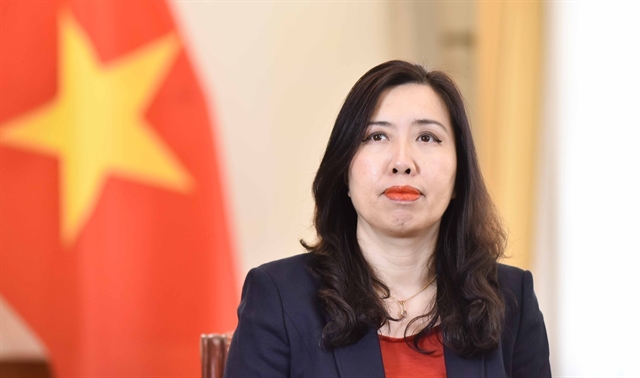 |
| Deputy Foreign Minister of Việt Nam Lê Thị Thu Hằng. VNA/VNS Photo |
Could you tell us about the qualitative and quantitative changes in the role of the Vietnamese diasporic community in the country’s development?
The Vietnamese diasporic community have always stood alongside the nation throughout its history. Speaking of the diaspora is to speak of the children of Việt Nam far from their homeland, who always remain connected to their roots, fostering national pride and contributing both culturally and materially, even sacrificing blood and sweat for the country.
From the early days of the Party's formation and the establishment of the nation, the revolutionary cause of Việt Nam has consistently received the enthusiastic support, assistance and invaluable contributions of overseas Vietnamese across five continents.
Many intellectuals and patriots from the overseas Vietnamese community answered the call of the motherland, returning to be trusted and assigned important roles by President Hồ Chí Minh, contributing their knowledge and efforts to the resistance wars and the nation's reconstruction and defence.
Particularly during the Đổi mới (Renewal) era, the contributions of overseas Vietnamese—be it in material resources, intellect or management experience—have played an immense role, helping Việt Nam overcome a challenging period to achieve the status and strength it enjoys today.
The Vietnamese diasporic community has grown and matured, deeply integrated into the political, economic, cultural, and social life of their host countries. They have significant influence in more than 130 countries and territories around the world.
Currently, there are approximately 600,000 experts and intellectuals, or about 10-12 per cent of the overseas Vietnamese population worldwide. This includes thousands of PhD holders and hundreds of renowned intellectuals of international repute.
These people have undergone rigorous training in advanced countries, possess practical experience and work in environments characterised by cutting-edge science and technology. They master economic management methodologies and have strong ties within their host countries and globally.
Many hold key positions in research institutions, universities, hospitals, corporations, and international organisations.
Moreover, the second and third generations of Vietnamese scientists and experts are emerging as leaders in various fields, particularly in cutting-edge scientific disciplines and key global economic sectors such as electronics-information technology, biotechnology, space science, advanced materials, nanotechnology, energy, and medicine. They also excel in fields integral to the Fourth Industrial Revolution, including economic and financial management and AI.
For instance, in Silicon Valley, the United States alone, engineers of Vietnamese origin comprise two to three per cent of the workforce at technology companies and corporations, with about two per cent holding key leadership positions.
Việt Nam is entering a new era of development -- the era of the nation on the rise.
This elevated stage of growth calls for the collective strength of the Vietnamese people both within and outside the country.
The Party and State have made it clear that overseas Vietnamese constitute an invaluable asset to the nation, and they deeply hope that the overseas community will continue to closely accompany the nation on this new journey, a journey demanding great wisdom and effort for national advancement.
Addressing the Forum of Overseas Vietnamese Intellectuals and Experts and the 4th Global Conference of Overseas Vietnamese in August 2024, Prime Minister Phạm Minh Chính said: “Alongside contributions of material wealth, the contributions of knowledge, ideas, initiatives, and scientific and technological expertise from the overseas Vietnamese community are invaluable resources for national development today.”
This is both a call to action and a testament to the homeland's trust in its expatriates to help build a prosperous and sustainable Việt Nam.
In this new era of the nation on the rise, what are the core tasks, solutions and reforms in the committee’s operations to mobilise resources from the overseas Vietnamese community?
The new era brings new missions for the work concerning overseas Vietnamese and the committee in particular. It necessitates proactive, comprehensive and innovative efforts not only within the committee but also throughout the political system, domestically and abroad. These efforts aim to mobilise the immense material and spiritual resources of the overseas community to meet the country’s development demands in this new period.
First and foremost, the work concerning overseas Vietnamese must fully embody and enhance the tradition of national unity. Every policy and directive must reflect this spirit.
We must strive to motivate, encourage and harness the Vietnamese diaspora's vast resources while strongly demonstrating the Party, State and people's care and responsibility for those living far from their homeland. The work concerning overseas Vietnamese must be holistic and seen as the shared responsibility of the entire political system and society.
The focus of this effort lies in supporting the overseas community to stabilise their lives, integrate successfully into their host societies. At the same time, it is essential to care for, support and protect their legitimate rights and interests.
In terms of content, while building on past achievements, we must identify new drivers that connect the overseas community with one another and with their homeland. This requires continuously innovating methods of support and mobilising the community’s contributions, unlocking their full potential. VNS

